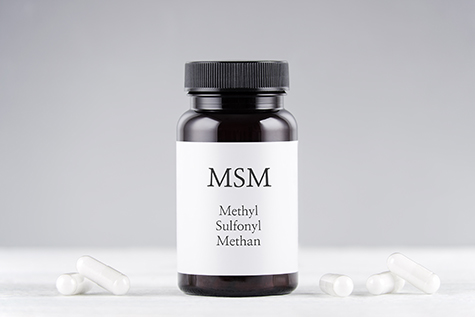Can MSM Ease the Pain of Arthritis?


 Osteoarthritis is the most common form of arthritis, affecting about 18% of women and 10% of men over the age of 60 years worldwide. Given how common this disease is and the fact that it causes significant chronic disability due to joint degeneration and reduced mobility, supplements for osteoarthritis are hugely popular with an estimated 30%+ of individuals seeking natural products for joint pain.
Osteoarthritis is the most common form of arthritis, affecting about 18% of women and 10% of men over the age of 60 years worldwide. Given how common this disease is and the fact that it causes significant chronic disability due to joint degeneration and reduced mobility, supplements for osteoarthritis are hugely popular with an estimated 30%+ of individuals seeking natural products for joint pain.
 You probably haven’t heard of Methylsulfonylmethane but you may have heard of “MSM” and usually this supplement is suggested for joint pain. MSM is used for a variety of chronic pain conditions including osteoarthritis, rheumatoid arthritis, osteoporosis, bursitis, muscle cramping, scar tissue, stretch marks and wrinkles. This compound occurs naturally in many plants and the milk and urine of bovines and humans. It can be formulated into a common supplement that can be bought over the counter in many drug and natural health stores. But does it work, and is it safe?
You probably haven’t heard of Methylsulfonylmethane but you may have heard of “MSM” and usually this supplement is suggested for joint pain. MSM is used for a variety of chronic pain conditions including osteoarthritis, rheumatoid arthritis, osteoporosis, bursitis, muscle cramping, scar tissue, stretch marks and wrinkles. This compound occurs naturally in many plants and the milk and urine of bovines and humans. It can be formulated into a common supplement that can be bought over the counter in many drug and natural health stores. But does it work, and is it safe?
Research on MSM for joint pain, particularly with osteoarthritis, are mixed. Studies show that taking a range of doses from 1.5-6 grams of MSM divided into 2-3 measures daily can modestly reduce the pain and swelling symptoms of osteoarthritis and improve joint function. Those expecting to notice a significant improvement in symptoms may be disappointed as most studies show relatively small changes that could result in a reduction of the need for other anti-inflammatory drugs. For many, even a small improvement is worth taking the supplement and there are some human clinical studies that show promise for the improvement of physical function, pain and stiffness.
There is some promising research on MSM for more than joint pain. Some studies have found that it can be helpful for certain types of breast and liver cancers. Note that the results of MSM for cancer are still preliminary and most of this research is being done in labs and in animal studies. Is has also shown some benefit for recovery from intense physical activity, possibly because it helps reduce uric acid and boost antioxidant status in the body. It is too early to recommend MSM for these types of uses yet but it definitely is a promising substance for a variety of health conditions.

Exactly how to take MSM can be confusing because it comes in a large variety of dosages and is an ingredient in many products, often used in combination with other ingredients like glucosamine. Standardization of formulas can vary greatly as well. Adult dosages range anywhere from 500-8,000mg and is generally suggested to take with food. While studies indicating toxicity are somewhat lacking, MSM is generally recognized as safe in therapeutic doses and many different studies suggest that it is safe. Interactions with other drugs or herbs are largely unknown so it is very important to discuss adding in this supplement with your doctor to ensure safety.
When choosing any supplement, be sure to find a brand that has been third-party certified and tested for quality assurance. To find which dose might be right for you and your unique needs, be sure to meet with a doctor familiar with supplements who can speak to the safety and appropriateness of MSM for you.
Ginger Hultin, MS, RD, CSO, LDN, is a health writer and owner of Champagne Nutrition specializing in integrative health and whole food-based nutrition. She serves as Immediate Past President for the Chicago Academy of Nutrition and Dietetics, Chair-Elect of the Vegetarian Nutrition Dietetic Practice Group and is a Media Representative for the Illinois Academy. Read Ginger’s blog, Champagne Nutrition, and follow her on Facebook, Twitter, Instagram and Pinterest.
Ginger Hultin MS RD CSO LDN
gingerhultin@hotmail.com | @GingerHultinRD
Chair-Elect, Vegetarian Nutrition Dietetic Practice Group
ChampagneNutrition.com
References
Natural Medicines Database. MSM (Methylsulfonylmethane). https://naturalmedicines.therapeuticresearch.com/databases/food,-herbs-supplements/professional.aspx?productid=522. Updated March 14, 2014. Accessed March 24, 2016.
Kang DY, Darvin P, Yoo YB, Joung YH, Sp N, Byun HJ, Yang YM. Methylsulfonylmethane inhibits HER2 expression through STAT5b in breast cancer cells. Int J Oncol. 2016;48(2):836-42.
Kim JH, Shin HJ, Ha HL, Park YH, Kwon TH, Jung MR, Moon HB, Cho ES, Son HY, Yu DY.
Methylsulfonylmethane suppresses hepatic tumor development through activation of apoptosis. World J Hepatol. 2014;6(2):98-106.
Nakhostin-Roohi B, Niknam Z, Vaezi N, Mohammadi S, Bohlooli S.
Effect of single dose administration of methylsulfonylmethane on oxidative stress following acute exhaustive exercise. Iran J Pharm Res. 2013;12(4):845-53.
Tsui T, Boon H, Boecker A, Kachan N, Krahn M. Understanding the role of scientific evidence in consumer evaluation of natural health products for osteoarthritis an application of the means end chain approach. BMC Complement Altern Med. 2012;12:198.
Debbi EM, Agar G, Fichman G, Ziv YB, Kardosh R, Halperin N, Elbaz A, Beer Y, Debi R.
Efficacy of methylsulfonylmethane supplementation on osteoarthritis of the knee: a randomized controlled study. BMC Complement Altern Med. 2011;11:50.